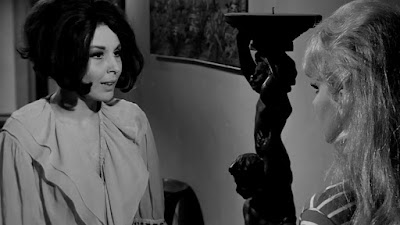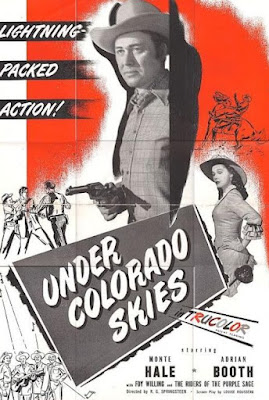 |
| Desi Arnaz, James Mason, Lucille Ball |
FOREVER DARLING (1956). Director: Alexander Hall.
Lorenzo or Larry Vega (Desi Arnaz), a chemist working on a new bug killer, is married to Susan (Lucille Ball), who is much influenced by her snobbish cousin, Millie (Natalie Schafer of Female on the Beach), whom Larry can't stand. Larry also feels that he and his wife are drifting apart after several years of marriage. He is hoping to rekindle things by taking her with him on a work-related trip, an idea that doesn't sit well with Susan. Then who should appear in her bedroom one night but James Mason (James Mason), who is actually Susan's guardian angel wearing the face of someone she admires. "James" gives Susan some sage advice, and convinces her to go off on a short trip with Larry so he can test his new insecticide, but things may not go exactly as planned ...
 |
| Arnaz and Lucy |
Made at the height of the popularity of
I Love Lucy, the main strength of
Forever Darling is its cast. Not
exactly playing the Ricardos, Arnaz and Ball are as wonderful as ever, James Mason -- who probably wondered how he ever wound up in this film -- is classy and excellent, and the ever-adept Louis Calhern [
The Asphalt Jungle] nearly steals the movie -- no easy feat -- as Susan's highly amusing father. Then we've also got Natalie Schafer, Nancy Kulp as the maid, John Hoyt and Willis Bouchey as Larry's associates, Mabel Albertson in a brief turn as a reporter, and John Emery in a very funny bit as a psychiatrist who tries to explain to Susan why she's seeing strange men in her bedroom.
Forever Darling, alas, is not as good as the other film the Desi-Lucy combo did, the very funny
The Long, Long Trailer, but it has its moments. What starts out
almost as a somewhat sophisticated drawing room comedy turns into an episode of
I Love Lucy as the couple have misadventures while camping, with their plastic boat springing a leak and so forth. It was probably decided that that was what the couple's fans wanted, but it makes the flick a bit lopsided. Nothing much really happens with the whole "guardian angel" idea, making the movie -- but for the delightful performances and a few laughs -- almost seem pointless. Still, it's
Lucy! The theme song by composer Bronislau Kaper is pleasant, sung by the Ames brothers over the credits and by Desi late in the picture. He also sang the tune on an episode of
Lucy. Marilyn Maxwell appears in a move-within-a-movie sequence with Mason.
Verdict: Has a certain degree of charm and amusing performances, but the script -- an old one dusted off for Lucy and Desi -- could have used some work. **3/4.





























